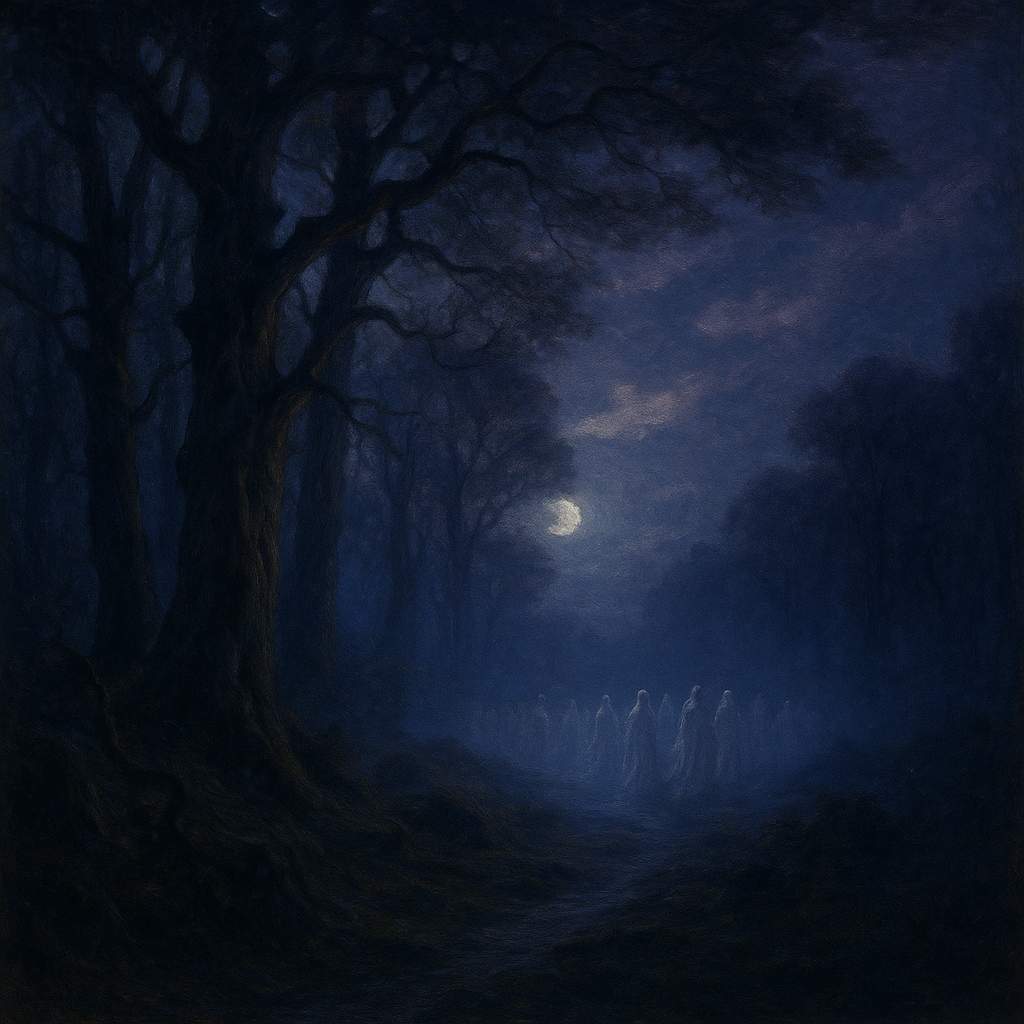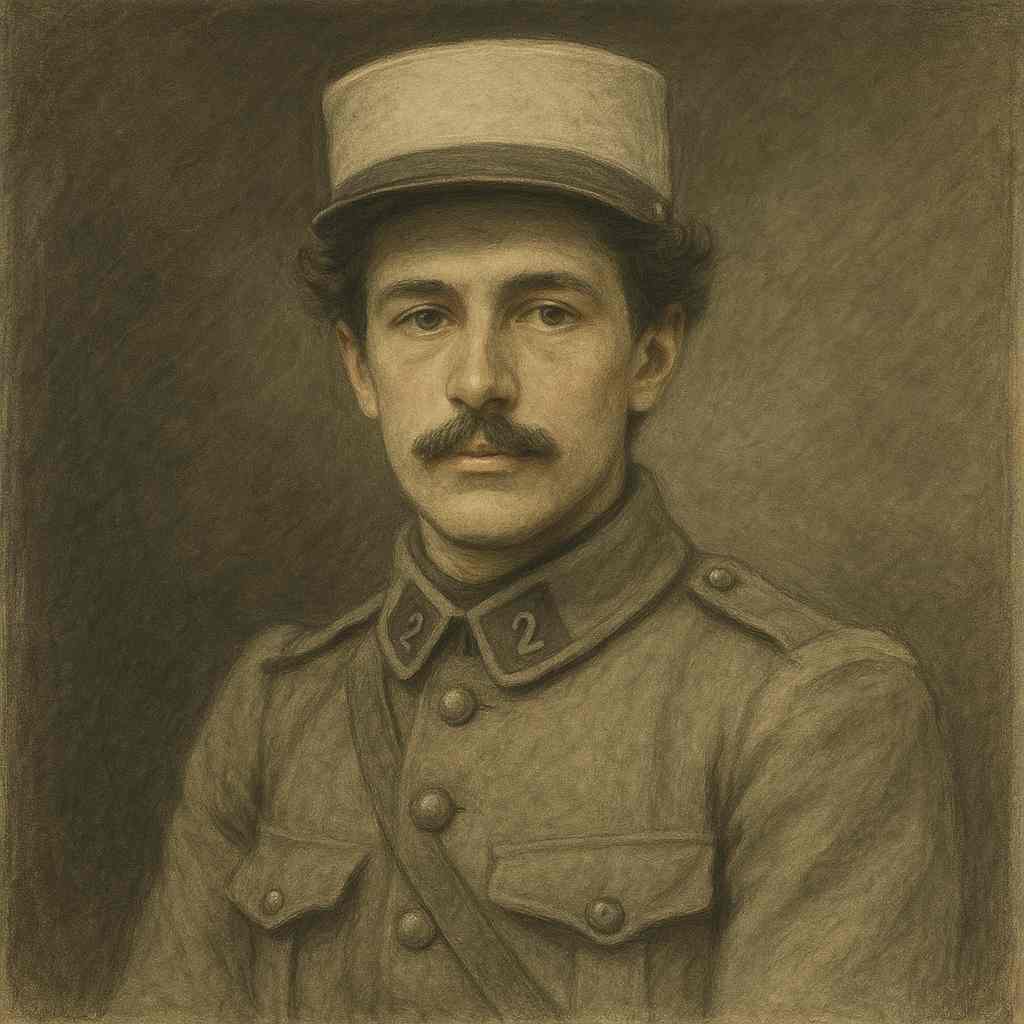Broceliande
Alan Seeger
1888 to 1916

Broceliande! in the perilous beauty of silence and menacing shade,
Thou art set on the shores of the sea down the haze of horizons untravelled, unscanned.
Untroubled, untouched with the woes of this world are the moon-marshalled hosts that invade
Broceliande.
Only at dusk, when lavender clouds in the orient twilight disband,
Vanishing where all the blue afternoon they have drifted in solemn parade,
Sometimes a whisper comes down on the wind from the valleys of Fairyland—
Sometimes an echo most mournful and faint like the horn of a huntsman strayed,
Faint and forlorn, half drowned in the murmur of foliage fitfully fanned,
Breathes in a burden of nameless regret till I startle, disturbed and affrayed:
Broceliande—
Broceliande—
Broceliande. . . .
Alan Seeger's Broceliande
Alan Seeger’s Broceliande is a hauntingly beautiful poem that evokes the mystique of an enchanted forest, steeped in Arthurian legend and Romantic melancholy. Written in the early 20th century, the poem reflects Seeger’s fascination with medieval lore, his preoccupation with beauty and transience, and his own existential longing—themes that would later define his tragically short life as a soldier-poet. Through its rich imagery, atmospheric tension, and emotional depth, Broceliande transcends mere description of a mythical landscape, becoming instead a meditation on longing, loss, and the elusive nature of enchantment.
This essay will explore the poem’s historical and cultural context, its use of literary devices, its central themes, and its emotional resonance. Additionally, we will consider Seeger’s biographical influences, the philosophical undertones of the poem, and its place within the broader tradition of Romantic and Symbolist poetry.
Historical and Cultural Context
Broceliande: The Mythic Forest
The title of the poem refers to the legendary forest of Brocéliande in Brittany, France—a setting deeply embedded in Arthurian mythology. It was said to be the dwelling place of Merlin, the Lady of the Lake, and other figures of enchantment. By the late 19th and early 20th centuries, this mythic locale had become a symbol of lost beauty and forgotten magic, often invoked by Romantic and Decadent poets.
Seeger’s choice of Broceliande aligns with the broader fin-de-siècle fascination with medievalism and escapism. In an era marked by industrialization and the looming catastrophe of World War I, many artists turned to myth and fantasy as a refuge from modernity. The poem’s dreamlike, otherworldly atmosphere suggests a yearning for a purer, more mystical past—one that contrasts sharply with Seeger’s own reality as a soldier who would later die in battle.
Seeger’s Life and Influences
Alan Seeger (1888–1916) was an American poet who, like many of his generation, was deeply influenced by Romantic and Symbolist traditions. His work often reflects the aestheticism of Keats, the melancholy of Baudelaire, and the doomed romanticism of Rupert Brooke. Seeger’s life was cut short when he was killed in action during World War I, and his poetry frequently grapples with themes of beauty, mortality, and fate.
Broceliande can be read as part of Seeger’s broader poetic project: an attempt to capture fleeting beauty before it vanishes. The poem’s mournful tone suggests an awareness of impermanence, a theme that would become tragically prophetic in light of his early death.
Literary Devices and Imagery
Sensory and Atmospheric Language
Seeger employs lush, evocative language to immerse the reader in the forest’s eerie beauty. Phrases like "the perilous beauty of silence and menacing shade" and "the haze of horizons untravelled, unscanned" create a sense of mystery and foreboding. The forest is not merely a place but a living entity—both alluring and dangerous.
The poem’s sensory details are deliberately ambiguous, blurring the line between the real and the supernatural. The "moon-marshalled hosts" suggest spectral or fairy processions, reinforcing the idea of Broceliande as a liminal space where the boundaries between worlds dissolve.
Repetition and Refrain
The repetition of "Broceliande" at the end of each stanza functions as an incantation, deepening the poem’s hypnotic quality. The final lines—
"Broceliande—
Broceliande—
Broceliande. . . ."
—trail off like an echo, mimicking the fading sound of a horn or a whisper lost in the wind. This technique not only enhances the musicality of the poem but also reinforces its themes of ephemerality and vanishing enchantment.
Symbolism and Ambiguity
The "whisper... from the valleys of Fairyland" and the "echo most mournful and faint like the horn of a huntsman strayed" function as symbols of elusive beauty and lost quests. The horn, in particular, evokes medieval hunt imagery but also suggests futility—a sound that is heard but never answered.
The poem’s ambiguity is central to its power. Is the speaker truly hearing these sounds, or are they projections of his own longing? The "burden of nameless regret" implies an emotion too profound for words, a nostalgia for something never fully grasped.
Themes
Longing and the Unattainable
At its core, Broceliande is a poem about yearning—for the mythical, the beautiful, the just-out-of-reach. The forest symbolizes an idealized world that remains perpetually distant, much like the Romantic concept of the sublime. The speaker’s "startle, disturbed and affrayed" suggests both awe and unease, as if the very thing he desires is also unsettling in its intangibility.
This theme aligns with the German Romantic notion of Sehnsucht—an inconsolable longing for an unknown, perhaps unattainable, ideal. Seeger’s poem captures this emotion perfectly, presenting Broceliande as a place that can be sensed but never fully entered.
Time and Decay
The poem’s temporal setting—dusk—is significant. It is a transitional time, neither day nor night, symbolizing the liminal space between reality and dream. The "lavender clouds in the orient twilight disband", reinforcing the idea of dissolution and fleeting beauty.
The "murmur of foliage fitfully fanned" suggests a natural world in constant motion, indifferent to human longing. This imagery evokes the transience of life, a theme that would have resonated deeply with Seeger, who was already living under the shadow of war.
Isolation and the Sublime
The poem’s atmosphere is one of sublime isolation. The forest is "untroubled, untouched with the woes of this world", existing beyond human suffering. Yet this very detachment makes it alien and slightly menacing. The speaker’s encounter with Broceliande is solitary, almost mystical, reinforcing the idea that true enchantment exists beyond the reach of ordinary life.
Comparative Analysis
Romantic and Symbolist Precedents
Seeger’s poem shares affinities with Keats’ La Belle Dame Sans Merci, where a knight encounters an enchanting yet ultimately elusive fairy woman. Both poems explore the danger of longing for the supernatural, blending beauty with melancholy.
Similarly, the Symbolist poets—particularly Baudelaire and Mallarmé—sought to evoke emotions through suggestion rather than direct statement. Seeger’s use of half-heard whispers and fading echoes aligns with Symbolist techniques, where meaning is often shrouded in mystery.
Contemporary War Poetry
Though Broceliande is not explicitly a war poem, its themes of loss and ephemerality take on new meaning when read alongside Seeger’s later works, such as I Have a Rendezvous with Death. The forest could be seen as a premonition—a beautiful but doomed realm, much like the pre-war world on the brink of destruction.
Philosophical and Emotional Resonance
The Allure of the Unseen
The poem taps into a fundamental human fascination with the unknown. Broceliande represents the mysteries that lie just beyond perception—whether they be fairy realms, lost loves, or unfulfilled destinies. The faint echoes and whispers suggest that these mysteries are always present, if only we could hear them.
Nostalgia for Lost Worlds
Seeger’s poem can also be read as an elegy for a vanishing world. The early 20th century was a time of rapid change, and many artists mourned the loss of older, more mythic ways of seeing. Broceliande becomes a metaphor for all that has been—or will soon be—lost.
Conclusion
Broceliande is a masterful blend of myth, melancholy, and atmospheric beauty. Through its rich imagery, haunting refrains, and themes of longing and transience, the poem captures the essence of Seeger’s poetic vision—one that is deeply Romantic yet tinged with modernist unease.
In the end, the poem leaves us with a sense of unresolved yearning, much like the faint horn of the huntsman that lingers in the air before vanishing. It is this emotional resonance—this ability to evoke both wonder and sorrow—that makes Broceliande a timeless work, one that continues to enchant readers long after its creation.
Seeger’s own fate—dying young in a war that shattered the old world—adds a poignant layer to the poem’s themes. Like the elusive whispers of Broceliande, his poetry remains a fleeting, beautiful echo of a lost time.
This text was generated by AI and is for reference only. Learn more
Want to join the discussion? Reopen or create a unique username to comment. No personal details required!



Comments
No comments yet. Be the first to comment!